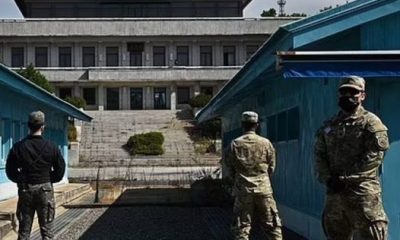Comments and Issues
The Protocols of Donald J. Trump
Published
7 years agoon
By
Olu Emmanuel
By Robert Skidelsky
It is an odd quirk in the history of logic that the blameless Cretans should have given their name to the famous “liar paradox.” The Cretan Epimenides is supposed to have said: “All Cretans are liars.” If Epimenides was lying, he was telling the truth – and thus was lying.
Something similar can be said of US President Donald Trump: Even when he’s telling the truth, many assume he is lying – and thus being true to himself. His trolling is notorious. For years, he claimed, with no evidence other than unnamed sources that he called “extremely credible,” that Barack Obama’s birth certificate was fraudulent. During the Republican primary, he linked his opponent Senator Ted Cruz’s father to John F. Kennedy’s assassination. He has promoted the quack idea that vaccines cause autism, and has masterfully deployed the suggestio falsi – for example, his insinuation that climate change is a Chinese hoax designed to cripple the American economy.
There has always been a thriving market for fake information, forgeries, hoaxes, and conspiracy theories. “History is a distillation of rumor,” wrote Thomas Carlyle in the nineteenth century. Sellers of fakery manufacture information for money or for political profit; there are always eager buyers among the credulous, prurient, or vindictive. And gossip is always entertaining.
Modern history provides us with some famous examples. The Zinoviev letter, a forgery implicating Britain’s Labour Party in Kremlin-led Communist sedition, was published by the Daily Mail four days before the United Kingdom’s general election in 1924, dashing Labour’s chances.
ALSO SEE: Comey tape: US President Trump recounts, says he lied
Perhaps the most famous such forgery was The Protocols of the Elders of Zion. Possibly manufactured for money, The Protocols purported to be evidence of a Jewish plan for world domination. Its key passage reads: “[…] we shall so wear down the Goyim that they will be compelled to offer us an international power that by its position will enable us without any violence gradually to absorb all the State forces of the world and to form a Super-Government.” Circulated by the Czarist secret police in the early 1900s to justify the regime’s anti-Jewish pogroms, it became the foundation of the anti-Semitic literature of the first half of the twentieth century, with horrendous consequences.
So what is new? The attention being paid to fake information today arises from the hugely expanded speed with which digitally manufactured information travels around the world. In the past, one had to be able to hoodwink more or less reputable news outlets to plant fake stories. Now misinformation can go viral through social media, like a modern Black Death.
The important question is how this will affect democracy. Will the unprecedented ease of access to information liberate people from thought control, or will it strengthen it to such an extent that democracy simply drowns in a sea of manipulation?
Optimists and pessimists both have good arguments. “Knowledge is power,” say the optimists. It seems to follow that the more information made available, the more knowledgeable voters will be, and therefore the more able to hold leaders to account.
But information, the pessimists point out, is not knowledge. Information has to be structured to become knowledge. Institutions like schools, universities, newspapers, and political parties have been our traditional structuring devices. But digital technology is institutionally naked. It provides no structuring mechanism, and therefore no control on the spread of knowledge-free opinion.
Social media have undoubtedly played a part in the rise of the populist politics that thrives in such an environment. Left-wing populists, like Jeremy Corbyn in the UK, Bernie Sanders in the US, and Jean-Luc Mélenchon in France, received a significant boost from social media’s ability to bypass traditional news outlets. Right-wing populists, like Trump, Marine Le Pen in France, and Geert Wilders in the Netherlands, benefited in exactly the same way. Both sides accuse long-established media outlets of “faking” news.
ALSO SEE: Trump cancels transgender in US military
Perhaps the market for news will eventually find its own equilibrium between truth and falsehood. A fraction of the population will always be willing buyers of fake news; but the majority will learn to distinguish between trustworthy and unreliable sources.
But if the spread of misinformation is thought of as a virus, there is no natural equilibrium to be had, short of catastrophe. So it has to be checked by inoculation.
Few trust politicians, who often have a vested interest in false information, to do the job. One answer is independent agencies along the lines of the consumer watchdog Which? There are a number of websites now devoted to fact checking and debunking putative news stories. One of the best known, Snopes.com, was launched in 1994 as a project to check the accuracy of urban legends. Facebook is now attempting to flag fake news stories by noting that they have been “disputed by third-party fact checkers.”
Worthy though these attempts are, they suffer from an inherent weakness: they still place responsibility on readers to check whether a news story is true. But we are all liable to seek information that confirms our beliefs and ignore information that challenges them. Facts will not be checked by those whose beliefs depend on not checking them.
There are no easy answers. Obviously, education in critical thinking, and especially in social sciences such as economics, is necessary. But will that be sufficient to counter the massive increase in the ability to spread fake information?
Democracy depends both on the right to free speech and the right to know. We may have no alternative but to strike a new balance between the two.
Robert Skidelsky, Professor Emeritus of Political Economy at Warwick University and a fellow of the British Academy in history and economics, is a member of the British House of Lords.
You may like


US Soldier arrested by North Korea for unauthorized crossing


Trump slashes foreign aid in new budget proposal


US Nigeria’s visa suspension only on immigrant visas, not total restriction – presidency


Oil extends gain as U.S stockpiles fall


Trump begins mass deportation of illegal Nigerian migrants, others


Oil prices steady as U.S. sanctions on Iran begin
Trending

 Business6 days ago
Business6 days agoDollar crashes further against Naira at parallel market

 Business6 days ago
Business6 days agoRecapitalisation: Zenith Bank to raise funds in international capital market

 Education6 days ago
Education6 days agoArmy reveals date for COAS 2024 first quarter conference

 Crime6 days ago
Crime6 days agoFleeing driver injures two on Lagos-Badagry expressway

 Covid-196 days ago
Covid-196 days agoBritish legislator demands Bill Gates, other ‘COVID Cabal’ faces death penalty

 Business6 days ago
Business6 days agoZenith Bank surpasses N2trn earnings milestone

 Latest4 days ago
Latest4 days agoIsrael pounds Hezbollah with airstrikes after Iran attack

 Featured1 week ago
Featured1 week agoAmerican football icon OJ Simpson goes home

